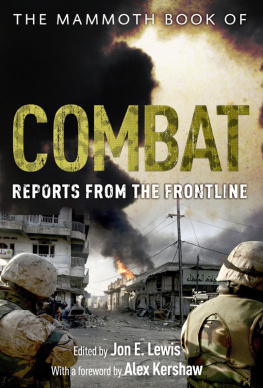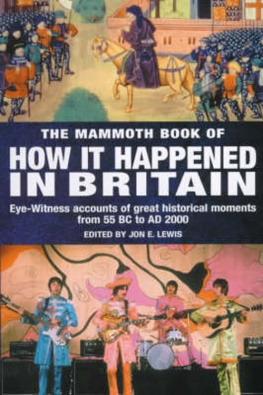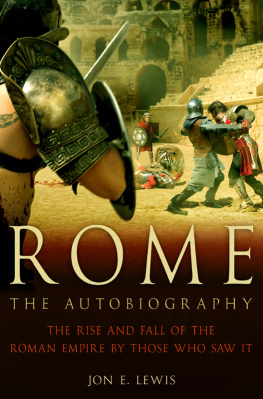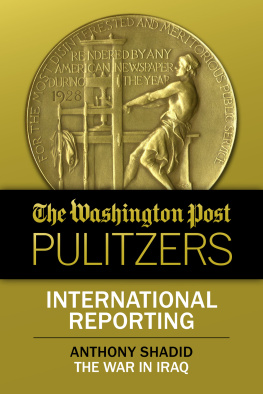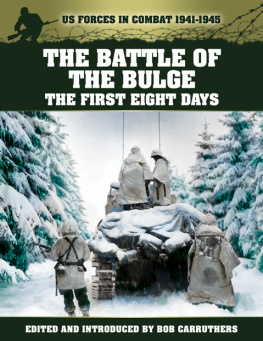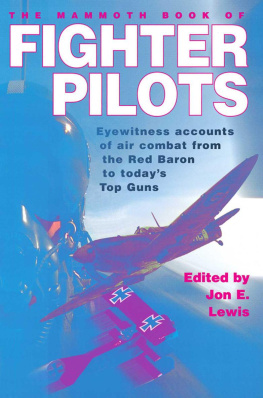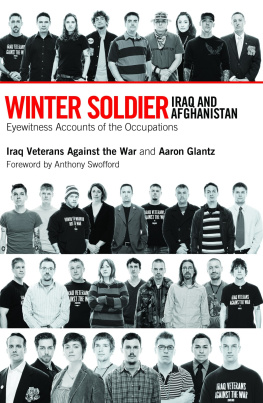Jon E. Lewis is a writer and historian. His many previous books include the bestselling The Mammoth Book of the Edge, Mammoth Book of Polar Journeys, The Mammoth Book of True War Stories and World War II: the Autobiography.
Titles by Jon E. Lewis
World War II: The Autobiography
London: The Autobiography
Rome: The Autobiography
Survivor: The Autobiography
SAS: The Autobiography
Spitfire: The Autobiography
The Mammoth Book of Native Americans
The Mammoth Book of On The Edge
The Mammoth Book of Antarctic Journeys
The Mammoth Book of Conspiracies
The Mammoth Book of True War Stories
The Mammoth Book of Wild Journeys
Voices from the Holocaust
Foraging: The Essential Guide
(as John Lewis-Stempel)
THE MAMMOTH BOOK OF
Combat
Edited by Jon E. Lewis

Constable & Robinson Ltd
5556 Russell Square
London WC1B 4HP
www.constablerobinson.com
First published in the UK as The Mammoth Book of War Correspondents
by Robinson, an imprint of Constable & Robinson Ltd, 2001
This revised, updated edition published as The Mammoth Book of Combat
by Robinson, 2013
Copyright Jon E. Lewis, 2001, 2013
(unless otherwise stated)
The right of Jon E. Lewis to be identified as the author of this work has been asserted by him in accordance with the Copyright, Designs and Patents Act 1988
All rights reserved. This book is sold subject to the condition that it shall not, by way of trade or otherwise, be lent, resold, hired out or otherwise circulated in any form of binding or cover other than that in which it is published and without a similar condition including this condition being imposed on the subsequent purchaser.
A copy of the British Library Cataloguing in
Publication Data is available from the British Library
ISBN: 978-1-78033-917-7 (paperback)
ISBN: 978-1-78033-918-4 (ebook)
First published in the United States in 2013 as The Mammoth Book of Combat
by Running Press Book Publishers, a Member of the Perseus Books Group
All rights reserved under the Pan-American and International Copyright Conventions
Books published by Running Press are available at special discounts for bulk purchases in the United States by corporations, institutions, and other organizations. For more information, please contact the Special Markets Department at the Perseus Books Group, 2300 Chestnut Street, Suite 200, Philadelphia, PA 19103, or call (800) 810-4145, ext. 5000, or e-mail .
US ISBN: 978-0-7624-4812-8
US Library of Congress Control Number: 2012942536
9 8 7 6 5 4 3 2 1
Digit on the right indicates the number of this printing
Running Press Book Publishers
2300 Chestnut Street
Philadelphia, PA 19103-4371
Visit us on the web!
www.runningpress.com
Printed and bound in the UK
Cover copyright Constable & Robinson
Contents
Foreword
Honest war reporters have never had it easy. From the earliest days of their trade to the present, cheerleaders rather than skeptics have been the most successful. The London Times William Howard Russell, who covered the Crimea War to great acclaim, would discover just five years later how picking the wrong side could backfire when his predictions of a Union victory in the American Civil War scandalized his readers and led to his resignation. He was not, as he claimed, the first and greatest of war correspondents but he was indeed one of the miserable parents of a luckless tribe that has dared to ask the wrong questions of the odds-on favourites and paid for their insolence ever since, often with their lives.
The Civil War was perhaps the first war whose horror was revealed in heart-rending detail by at least some correspondents, for what could be glorious about a fratricide in which more Americans died than in WWII? Samuel Wilkeson of the New York Times, for example, reported on the slaughter at Gettysburg with great power and poignancy, delivering his dispatch having just learned that his own son had died.
It was the first great celebrity reporter, Richard Harding Davis, working for William Randolph Hearsts yellow press, who delivered perhaps the most impactful newspaper report in history, in the run up to the Spanish-American War in 1898. The Death of Rodriguez, the story of the public execution of a rebel, whom Davis watched die, the blood from his breast sinking into the soil he had tried to free, changed public opinion in America like no other report before or since. Desperate to increase circulation, Hearst was delighted with Daviss breathless propaganda. Davis was not a flat-out liar, however, and lesser figures had to be employed to guarantee Hearst the circulation-boosting conflict he so desired.
Davis was again in the thick of the action during the Russo-Japanese War in 1904, the first time a Western power was humiliated by an Asian nation. The Japanese were so strict in their censorship that Daviss celebrity grew not through his derring-do on the battlefield but because he managed to save Jack London, a fellow correspondent and world famous author of The Call of the Wild, from incarceration. London had struck a Japanese in frustration, having stewed with the rest of the press corps in Tokyo, barred from the front.
The first casualty, when war comes, is truth. So declared American Senator Hiram Johnson at the height of the first great bloodbath of the last century: a war to end all wars in which the best and brightest in Europe were mowed down in Flanders for four long years. Throughout the First World War, censorship was even stricter than that suffered by Jack London at the hands of the Japanese. Even jingoists like Rudyard Kipling There are human beings and Germans confronted a military whose leaders feared and therefore despised war correspondence.
Britains Secretary of State for War, Lord Kitchener, was chief among the detractors, describing the press as drunken swabs. Rare was the sober report throughout the war, even when young men were falling in the tens of thousands each week on the Somme and at Verdun for just a few yards of barbed wire and mud. It is doubtful that Americas entry into the conflict, shamefully managed throughout with horrendous and callous loss of life, would have occurred had it not been for the hysterical reporting of much of the American press.
The truth of war was still hard to find between the two world wars, whether in Russia or Spain, where ideologies violently divided nations. As Europe teetered on the brink yet again, George Orwell wrote from the Spanish Civil War, trying to warn of the horrors of fascism. Yet he left the conflict disillusioned by all sides, disgusted by the bias of left and right: I saw newspaper reports which did not bear any relation to the facts, not even the relationship which is implied in an ordinary lie.
The Second World War was, by contrast, perhaps a golden age of frontline prose, starring such humanistic scribblers as Ernie Pyle whose sparse and heart-felt reports on ordinary GIs were adored by his subjects and readers alike. To this day, historians of that conflict a crazy hysterical mess as John Steinbeck called it swoon over Pyles elegiac account of the death of a captain called Waskow in Italy. Unlike Hemingways self-regarding reports, Pyles beautifully crafted story of young men mourning their young leader still evokes the immense sadness of a war in which Pyle saw many swell kids having their heads blown off.
Pyle was in fact so nauseated by what he had seen that he eventually lost track of the whole point of the war. But it did have a point. Although it entailed the death in Europe of over 130,000 mostly working-class Americans, with a final butchers bill of over fifty million lives around the globe, the fighting in WWII was without doubt necessary if barbarism was to be defeated. The concentration camps visited by Richard Dimbleby and others in 1945 were all the evidence one needed of why the sacrifice was so important, if no less palatable. Tragically, Pyle was one of 53 US-accredited reporters to lose their lives covering the war, killed just a few months from the end of the war by a Japanese machine gunner.
Next page
